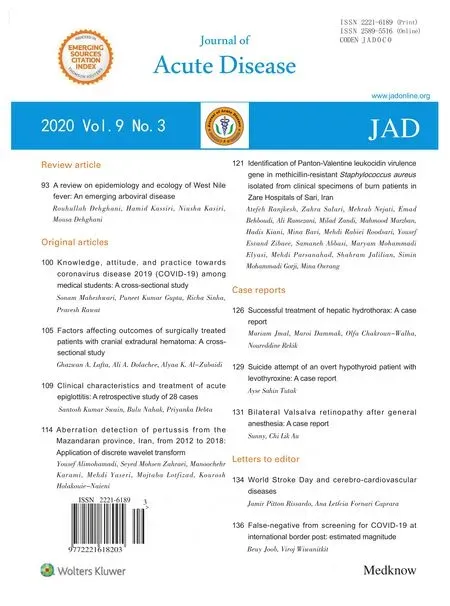False-negative from screening for COVID-19 at international border post: estimated magnitude
Beuy Joob, Viroj WiwanitkitSanitation Medical Academic Center, Bangkok, Thailand
2Dr DY Patil University, Pune, India
3Hainan Medical University, Haikou, China
COVID-19 is a newly emerging disease[1], which has already imported to many countries throughout the world. At present, active screening by thermo-scanning on immigrants from highrisk countries for COVID-19 at international border post is generally done by each country as a basic measurement for prevention of the disease. However, due to the possibility of afebrile presentation in COVID-19 cases[2], there is a chance of false-negative of screening. Here, the authors would like to share the observation from Thailand where COVID-19 has become a concerning public health problem. The aim is to determine the chance of false-negative from thermo-scanning for COVID-19 at international border post.
In Thailand, the thermo-scanning for COVID-19 at international border post has been initiated since 3rd January 2020. There are at least 30 314 international passengers passing the screening at international border posts, and 35 patients with COVID-19 were confirmed in Thailand up to 21st February 2020. Of these patients, 32 are imported cases. To estimate the magnitude or chance of false negative, the authors retrospectively analyzed the local data from Thai Center of Disease Control regarding COVID-19.
Of those 32 imported patients, 1 case was a patient evacuated back from China by the evacuation mission of Thailand, and the infection was confirmed during the quarantine period, so it was excluded from the present study. For the left 31 imported cases, 4 passed the screening but the infection was confirmed later. Therefore, the chance of false-negative is at least equal to 12.5% (95% CI: 5%-35%). This can show a chance of failure of the screening, resulting in further local transmission of COVID-19. Hence, it is no doubt that there is still a continuum of imported COVID-19 cases in Thailand[3].
In fact, the outbreak of COVID-19 has already been observed in several countries such as Korea, Japan, and Singapore, despite the implementation of thermo-scanning for COVID-19 at international border post. It is necessary to have a more effective preventive measurement against imported disease. Since a significant proportion of patients with COVID-19 do not have fever, and a proportion of the SARS-CoV-2 infected patients are in the incubation period when they are screened at the entry of international airport, so the sensitivity of the detection is very low. Therefore, the significance of a quarantine process, i.e., a screening at the portal of entry followed by a 2-week of quarantine after entering the country should be emphasized instead of a screening at the portal of entry only.
Conflict of interest statement
The authors report no conflict of interest.
Authors’ contribution
Both authors have equal contibuion.

